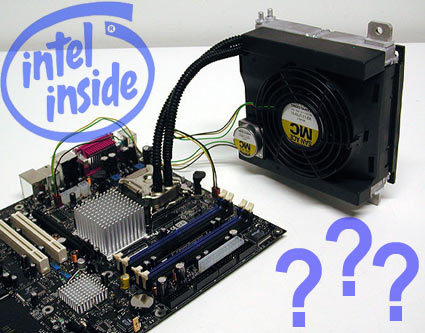Intel's CPU Heat Gets Watered Down
Get Tom's Hardware's best news and in-depth reviews, straight to your inbox.
You are now subscribed
Your newsletter sign-up was successful
Cheaper And Easier Liquid Cooling For High-End CPU Heat
Water or other liquids are already the coolants of choice in many industries. Porsche has long switched from air-coolants to water cooled engines. Nuclear reactors are water cooled. Now, the semiconductor industry is increasingly shifting from air to water.
The principles of thermal resistance dictate why liquid cooling is more efficient than air-cooling, which also show that the potential for liquid coolants to heat up is much lower compared to solids.
Also, when using air cooling systems, cooling down a relatively small device such as a microprocessor requires a decent heat sink plus a considerable air flow which can only be realized by fast rotating fans. At the end of the day, rapid airflows generated by high-speed fans inevitably involve undesirable noise levels.
Furthermore, Intel has other reasons to accelerate alternative cooling technologies. One reason we are already very familiar with is the current Pentium 4 Prescott that still today is the record holder in terms of leakage power and thermal loss. While this is not a problem for Intel's silicon (the specification allows for a thermal design power of up to 115 W), it causes a lot of headaches for DIY users, since both the processor and the voltage regulators will contribute in heating up your whole system. There are thus two facts that we can rely on today: First, liquid cooling systems are essentially more efficient than air cooling solutions, given a smart design. And second, Intel's future high-end processors will certainly not cool down any time in the near feature, which may have prompted Intel to initiate the development of an affordable, efficient and easy to deploy cooling solution by Sanyo Denki, its main cooling solution supplier.
Get Tom's Hardware's best news and in-depth reviews, straight to your inbox.
Current page: Cheaper And Easier Liquid Cooling For High-End CPU Heat
Next Page Impressions
Patrick Schmid was the editor-in-chief for Tom's Hardware from 2005 to 2006. He wrote numerous articles on a wide range of hardware topics, including storage, CPUs, and system builds.
